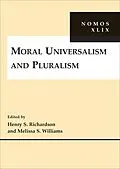Moral universalism, or the idea that some system of ethics applies to all people regardless of race, color, nationality, religion, or culture, must have a plurality over which to range?a plurality of diverse persons, nations, jurisdictions, or localities over which morality asserts a universal authority. The contributors to Moral Universalism and Pluralism, the latest volume in the NOMOS series, investigate the idea that, far from denying the existence of such pluralities, moral universalism presupposes it. At the same time, the search for universally valid principles of morality is deeply challenged by diversity. The fact of pluralism presses us to explore how universalist principles interact with ethical, political, and social particularisms. These important essays refuse the answer that particularisms should simply be made to conform to universal principles, as if morality were a mold into which the diverse matter of human society and culture could be pressed. Rather, the authors bring philosophical, legal and political perspectives to bear on the core questions: Which forms of pluralism are conceptually compatible with moral universalism, and which ones can be accommodated in a politically stable way? Can pluralism generate innovations in understandings of moral duty? How is convergence on the validity of legal and moral authority possible in circumstances of pluralism? As the contributors to the book demonstrate in a wide variety of ways, these normative, conceptual, and political questions deeply intertwine.
Contributors: Kenneth Baynes, William A. Galston, Barbara Herman, F. M. Kamm, Benedict Kingsbury, Frank I. Michelman, William E. Scheuerman, Gopal Sreenivasan, Daniel Weinstock, and Robin West.
Autorentext
Melissa S. Williams is Professor of Political Science at the University of Toronto. She is the author of Voice, Trust, and Memory and is the current editor of the NOMOS series.
Inhalt
Preface
Melissa S. Williams
Contributors
Henry S. Richardson
-
Contingency in Obligation
Barbara Herman
-
Moral improvisation, Moral Change, and Political institutions: Comment on Barbara Herman
Frank I. Michelman
-
Moral Improvisation and New Obligations
F. M. Kamm
-
Contingency at Ground Level: A Reply
Barbara Herman
-
The Idea of Political Pluralism
William A. Galston
-
Value Pluralism, Autonomy, and Toleration
Daniel M. Weinstock
The Limits of Liberal Pluralism: A Comment on William Galston
Robin West
Benedict Kingsbury
9. "The Center Cannot Hold”: A Response to Benedict Kingsbury
10. Cosmopolitanism and International Law
Kenneth Baynes
11. Democracy and International Law: A Peril from the "Public”?
Index
